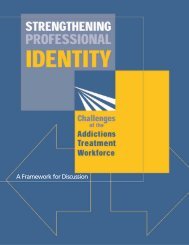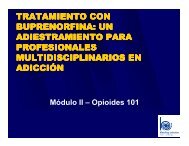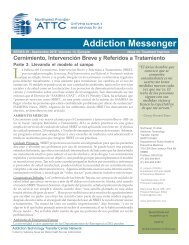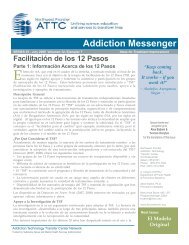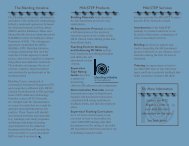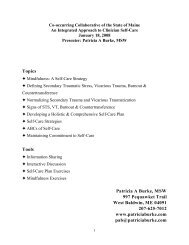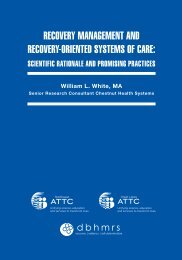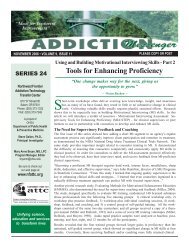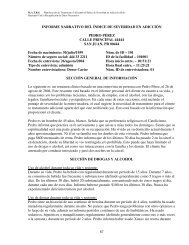alcohol and other drug problems among addiction professionals
alcohol and other drug problems among addiction professionals
alcohol and other drug problems among addiction professionals
Create successful ePaper yourself
Turn your PDF publications into a flip-book with our unique Google optimized e-Paper software.
tive in their jobs. These processes should become st<strong>and</strong>ardized on the agencylevel consistent with federal, state, <strong>and</strong> local laws <strong>and</strong> agency policies. Organizationsshould provide on-the-job training <strong>and</strong> mentoring programs to helppeople acquire the competencies necessary to do their jobs. Training is an ongoingnecessity because of the rapid change in environment <strong>and</strong> the need toaddress both “uncomplicated” <strong>addiction</strong> <strong>and</strong> <strong>addiction</strong> complicated by coexistingmental health disorders, legal <strong>problems</strong>, <strong>and</strong> social <strong>problems</strong>.11. Wellness: Organizations should develop wellness programs <strong>and</strong> practices totake care of employees, <strong>and</strong> provide effective supervision policies <strong>and</strong> practicesthat consider the wellness of the employees. These should include specificscheduled activities, including such things as retreats for the purpose of rejuvenation<strong>and</strong> burn-out prevention, peer support <strong>and</strong> mentoring practices, <strong>and</strong>“growth groups” to enhance professional development. These groups would beaimed at self-awareness <strong>and</strong> “spirituality recharge.”12. Impairment Policies: We need practical <strong>and</strong> enforceable policies for addressingimpaired <strong>professionals</strong> that reflect fair practices consistently applied to all<strong>addiction</strong> <strong>professionals</strong> <strong>and</strong> support staff. These policies should build trust <strong>and</strong>consistency in their application to staff at all levels of the organization. Theyshould include wellness policies designed to prevent <strong>problems</strong> <strong>and</strong> remainconsistent with professional <strong>and</strong> agency codes of ethics. They need to: (1) beenforceable, (2) be fair, (3) engender trust, (4) promote wellness, <strong>and</strong> (5) supporthigh ethical st<strong>and</strong>ards. This includes the training of boards of directors,clinical management teams, physicians, <strong>and</strong> therapeutic <strong>and</strong> support staff.Participants met again six months later to discuss what they had learned <strong>and</strong>the tools they had begun to create to help fulfill these needs. This Proceedingsdocument is an invitation to join, inform, explore, <strong>and</strong> exp<strong>and</strong> this discussion. Thedebate <strong>and</strong> the crafting of solutions will have to continue on a far wider scale, atorganizational, regional, national, <strong>and</strong> international levels. The magnitude of each<strong>addiction</strong> professional’s potential to heal or to harm deserves no less.n n



